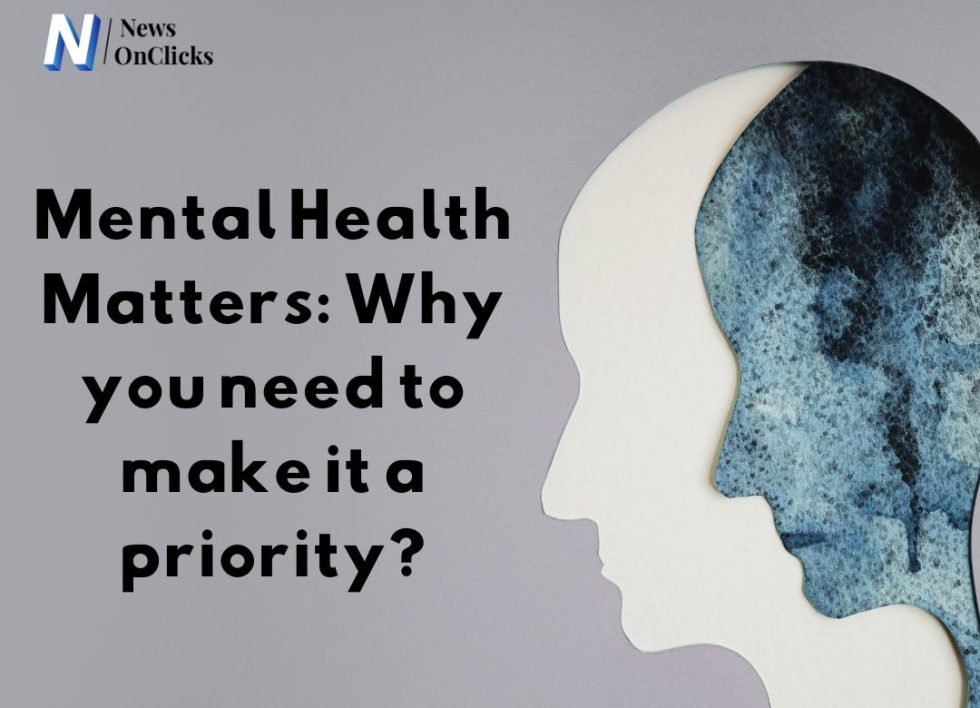
Your mental health should be a top priority in your life. However, for many of us, our mental wellbeing often takes a backseat to the daily demands of work, family, relationships, and responsibilities. We push through each day fuelled by coffee and sheer willpower, all while ignoring the importance of maintaining a healthy mind and stable emotional state.
You only get one mind and one life. Your mental health affects how you think, feel, and act each day. It influences your productivity, relationships, and overall happiness and satisfaction. While life’s challenges will always arise, you have the power to build mental resilience and wellbeing through self-care strategies and professional support when needed. Your mental health matters because you matter. Make it a priority and commit to practicing daily habits that strengthen your mind and lift your spirit. Your future self will thank you.
What Is Mental Health and Why Is It Important?
Mental health refers to your emotional, psychological, and social well-being. It affects how you think, feel, and act. It also helps determine how you handle stress, relate to others, and make choices.
Mental health is important for many reasons:
It influences your physical health. Mental health issues can be risk factors for chronic diseases like heart disease, diabetes, and cancer. They can also worsen symptoms or make health issues harder to treat.
It impacts your day-to-day life. Good mental health means you can form and maintain relationships, cope with life’s challenges, and engage in work or school. Poor mental health can make it difficult to handle responsibilities and engage in social activities.
It affects life expectancy. Some mental health conditions, especially severe cases of anxiety, depression, or post-traumatic stress disorder, can reduce life expectancy by years or even decades due to health issues or suicide.
It impacts happiness and life satisfaction. Your mental health plays a significant role in your ability to lead a happy, purposeful, and fulfilling life. Conditions like depression or anxiety can sap your enjoyment of life, optimism, and motivation.
In summary, mental health influences your physical health, daily functioning, life expectancy, and overall well-being. That is why prioritizing your mental health and getting treatment for any conditions is so critical for living a long, happy, and successful life. Make your mental health a priority and seek professional help if needed. Your mind and body will thank you.
Signs and Symptoms of Mental Health Issues
(1) Persistent feelings of sadness, worthlessness, or hopelessness. If you feel sad or empty for more than two weeks, it may be a sign of depression.
(2) Loss of interest in activities or hobbies you used to enjoy. Do you find yourself lacking motivation to do fun activities or engage in social interactions? This could indicate depression.
(3) Changes in appetite or sleep. Are you sleeping too much or too little? Have you lost your appetite or are you overeating? Changes in sleep and eating patterns can be a symptom of depression.
(4) Difficulty concentrating or making decisions. Do you struggle to focus at work or home? Can you not make up your mind about things you used to find easy to decide? Impaired concentration and indecisiveness are potential signs of depression.
(5) Feelings of worthlessness or guilt. Do you harshly criticize yourself or feel bad about yourself for no reason? Excessive guilt and low self-esteem are common with depression.
(6) Recurrent thoughts of death or suicide. If you find yourself frequently thinking about dying or suicide, seek help from a mental health professional immediately.
Depression is a serious but treatable condition. The earlier you recognize the signs, the sooner you can get the help you need. Speaking with a doctor or mental health specialist can help determine if you’re experiencing depression and explore treatment options like therapy, medication, or alternative treatments. Your mental health should be a top priority.
Seeking Professional Help for Mental Health Concerns
When mental health concerns start to significantly impact your day-to-day life, it is time to consider seeking professional help from a mental health professional. Speaking with a therapist or counsellor can help provide coping strategies, give you an outlet to express your feelings, and offer guidance on managing symptoms.
Connecting with a licensed therapist, psychologist, or psychiatrist is often the first step to getting proper treatment. These professionals are trained to assess your condition, diagnose any potential disorders, and recommend an appropriate treatment plan. Treatment may include counselling, medication, lifestyle changes, or alternative therapies.
Speaking with a primary care physician is also advisable, as they can check for any potential medical causes contributing to your symptoms and may be able to provide a referral to a mental health professional. Discussing your concerns with close ones who support you can also help in the process of seeking professional help.
When researching mental health professionals, look for those with experience treating your particular condition or area of concern. Meet with a few candidates to find one you feel comfortable opening up to, as the therapist-patient relationship is crucial to effective treatment. Don’t get discouraged if you need to try a few before finding the right match.
Be open and honest in your sessions to get the most out of your treatment. Mental health treatment often requires active participation to identify root causes of issues, learn coping strategies, and make meaningful lifestyle changes. Stay committed to the process, even when it gets difficult. Your mental health is worth it.
Prioritizing your mental health and wellness by speaking with a professional can help you gain perspective, find greater balance and fulfilment in life, and start down the path to healing. Make this important first step today.
Mental Health Tips and Strategies for Self-Care
•Reduce stress through exercise, meditation, yoga, deep breathing, spending time with loved ones and getting enough sleep.
• Practice gratitude daily by writing down 3 things you are grateful for to boost your mood.
•Limit alcohol and caffeine intake as they can worsen anxiety and depression. Drink plenty of water instead.
•Connect with others through spending time with family, friends and community groups for social support that improves mental health.
•Seek professional help for mental health conditions like anxiety and depression. Therapy can help you cope and feel better.
•When supporting others with mental health issues: listen without judgment, offer specific help, educate yourself, set boundaries to protect your own mental health, and help find additional resources.
Conclusion
In the end, you owe it to yourself to make your mental health a priority. Your mental wellbeing impacts everything in your life from your relationships and productivity to your physical health and longevity. While life’s demands seem endless, carving out time to maintain your mental health is critical. Speak to a therapist, engage in self-care, set boundaries, and make the time for the activities and people that fulfil you. Your mental health matters because you matter. Though the challenges of life are inevitable, you have the power to build resilience and stay well. Make that choice today – you deserve to lead a happy, healthy life surrounded by people who love and support you. There are always alternatives and help is out there, so take that first courageous step. You’ve got this!









